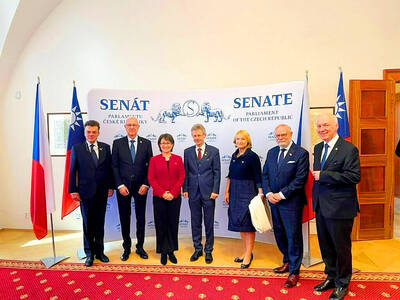A vast majority of Taiwanese disapprove of China's bid to change the cross-strait status quo by passing its "Anti-Secession" Law two years ago and believe that the people of Taiwan should be the only ones to have a say in determining the nation's future, a new think tank survey shows.
More than 90 percent of respondents disagreed with China's attempts to change the cross-strait status with the law, while nearly 80 percent think the Taiwanese should be the only decision makers in determining Taiwan's future, the survey found.
The Taiwan Thinktank conducted the poll from last Friday through Sunday to see if there had been a change in opinion since Beijing enacted the law two years ago today and gathered a total of 1,067 valid responses.
According to the results, 91.2 percent of respondents said they opposed the enactment of the "Anti-Secession" Law, 80.2 percent disagreed with China's claim that the law met the interests of Taiwanese and 79.5 percent said it was up to the people of Taiwan to determine the nation's future.
Only 14.5 percent of respondents believed that the people of China should also have a say in Taiwan's future.
"The result showed that the `Anti-Secession' Law has not alienated the people of Taiwan, it has provoked Taiwan to have a more consolidated consensus on its attitude toward China," said Lo Chih-cheng (羅致政), director of Soochow University's department of political science, at the press conference to announce the results yesterday.
"Beijing got the reverse of what it wanted from the legislation," Lo said.
Tung Li-wen (
"This law was in response to internal pressure in China on the `Taiwan issue' yet Beijing has been unable to define what [Taiwan's] independence is," he said.
The poll found 67.1 percent of respondents disagreed with the statement that China had actively contacted Taiwanese opposition parties while refusing to talk with with Taiwan's government.
Almost half of respondents, 47.2 percent, said the law had a bad influence on cross-strait relations, while 33 percent said it had not had any influence.
"This is a result of China using the carrot and the stick at the same time," said Hsu Yung-ming (
Meanwhile, a second opinion poll released by the Democratic Progressive Party (DPP) yesterday said about half of its respondents want to see Taiwan independent.
The poll was conducted last Wednesday and Thursday and received 1,034 valid responses.
It found that 50.4 percent of respondents favor independence while 33.9 percent support unification with China. Those were the only two options offered.
As for national identity, 68 percent said they considered themselves Taiwanese while 16 percent said they identified with China.
"This is a `gift' to China from the Taiwanese people on the eve of the second anniversary of the `Anti-Secession' Law," DPP Secretary-General Lin Chia-lung (
Additional reporting by Flora Wang

FREEDOM OF NAVIGATION: The UK would continue to reinforce ties with Taiwan ‘in a wide range of areas’ as a part of a ‘strong unofficial relationship,’ a paper said The UK plans to conduct more freedom of navigation operations in the Taiwan Strait and the South China Sea, British Secretary of State for Foreign, Commonwealth and Development Affairs David Lammy told the British House of Commons on Tuesday. British Member of Parliament Desmond Swayne said that the Royal Navy’s HMS Spey had passed through the Taiwan Strait “in pursuit of vital international freedom of navigation in the South China Sea.” Swayne asked Lammy whether he agreed that it was “proper and lawful” to do so, and if the UK would continue to carry out similar operations. Lammy replied “yes” to both questions. The

Two US House of Representatives committees yesterday condemned China’s attempt to orchestrate a crash involving Vice President Hsiao Bi-khim’s (蕭美琴) car when she visited the Czech Republic last year as vice president-elect. Czech local media in March last year reported that a Chinese diplomat had run a red light while following Hsiao’s car from the airport, and Czech intelligence last week told local media that Chinese diplomats and agents had also planned to stage a demonstrative car collision. Hsiao on Saturday shared a Reuters news report on the incident through her account on social media platform X and wrote: “I

SHIFT PRIORITIES: The US should first help Taiwan respond to actions China is already taking, instead of focusing too heavily on deterring a large-scale invasion, an expert said US Air Force leaders on Thursday voiced concerns about the Chinese People’s Liberation Army’s (PLA) missile capabilities and its development of a “kill web,” and said that the US Department of Defense’s budget request for next year prioritizes bolstering defenses in the Indo-Pacific region due to the increasing threat posed by China. US experts said that a full-scale Chinese invasion of Taiwan is risky and unlikely, with Beijing more likely to pursue coercive tactics such as political warfare or blockades to achieve its goals. Senior air force and US Space Force leaders, including US Secretary of the Air Force Troy Meink and

Czech officials have confirmed that Chinese agents surveilled Vice President Hsiao Bi-khim (蕭美琴) during her visit to Prague in March 2024 and planned a collision with her car as part of an “unprecedented” provocation by Beijing in Europe. Czech Military Intelligence learned that their Chinese counterparts attempted to create conditions to carry out a demonstrative incident involving Hsiao, which “did not go beyond the preparation stage,” agency director Petr Bartovsky told Czech Radio in a report yesterday. In addition, a Chinese diplomat ran a red light to maintain surveillance of the Taiwanese